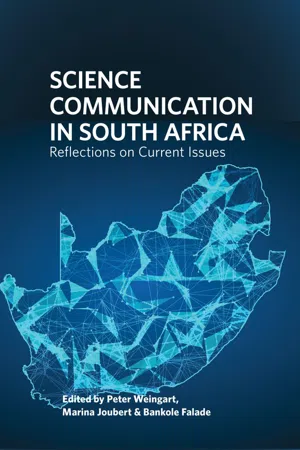
Science Communication in South Africa
Reflections on Current Issues
- 238 pages
- English
- PDF
- Available on iOS & Android
Science Communication in South Africa
Reflections on Current Issues
About This Book
Why do we need to communicate science? Is science, with its highly specialised language and its arcane methods, too distant to be understood by the public? Is it really possible for citizens to participate meaningfully in scientific research projects and debate? Should scientists be mandated to engage with the public to facilitate better understanding of science? How can they best communicate their special knowledge to be intelligible? These and a plethora of related questions are being raised by researchers and politicians alike as they have become convinced that science and society need to draw nearer to one another. Once the persuasion took hold that science should open up to the public and these questions were raised, it became clear that coming up with satisfactory answers would be a complex challenge. The inaccessibility of scientific language and methods, due to ever increasing specialisation, is at the base of its very success. Thus, translating specialised knowledge to become understandable, interesting and relevant to various publics creates particular perils. This is exacerbated by the ongoing disruption of the public discourse through the digitisation of communication platforms. For example, the availability of medical knowledge on the internet and the immense opportunities to inform oneself about health risks via social media are undermined by the manipulable nature of this technology that does not allow its users to distinguish between credible content and misinformation. In countries around the world, scientists, policy-makers and the public have high hopes for science communication: that it may elevate its populations educationally, that it may raise the level of sound decision-making for people in their daily lives, and that it may contribute to innovation and economic well-being. This collection of current reflections gives an insight into the issues that have to be addressed by research to reach these noble goals, for South Africa and by South Africans in particular.
Frequently asked questions
Information
Table of contents
- Cover
- Title page
- Copyright page
- Contents
- Acknowledgement
- 1. Introduction
- 2. Engaging the public in scientific research: Models, prospects and challenges from the perspective of scientists
- 3. Putting responsible research and innovation into practice at a local level in South Africa
- 4. Developing a targeted behavioural change communication strategy for a linguistically and culturally diverse community
- 5. The challenge of communicating science effectively in fisheries management
- 6. Science and social media: Opportunities, benefits and risks
- 7. The quackery virus: An overview of pseudoscientific health messages on Twitter
- 8. The amplification of uncertainty: The use of science in the social media by the anti-vaccination movement
- 9. Why impact evaluation matters in science communication: Or, advancing the science of science communication
- About the editors and the authors
- Back cover